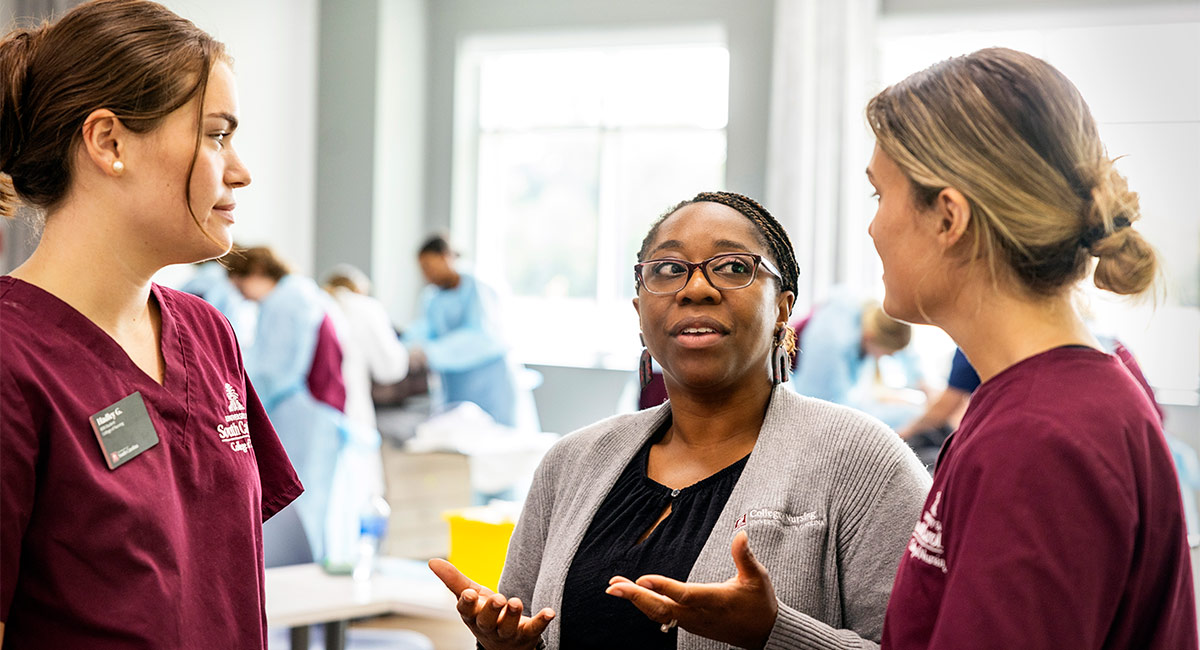
Joynelle Jackson, an associate professor of nursing at the University of South Carolina, tells her students that patients should look up from their hospital beds with the confidence that the nurse at their bedside has been trained well.
Jackson had the opportunity to test that feeling firsthand when she was in the hospital five years ago having her first child.
“So when the nurses walked in that room doing their various roles, I felt comfortable. And I trusted them because I trained them and I've seen what they can do,” Jackson says. “That was a really humbling experience to have all those former students there helping me.”
Jackson, the recipient of the university’s 2024 clinical practice teaching award, has been a full-time faculty member at the College of Nursing since 2007. But she’s been teaching much of her life.
When she was a student at the USC College of Nursing, friends in her study groups would tell her she explained concepts and procedures well.
“I kind of laughed it off, but in that moment, I also realized that I really liked explaining stuff to them,” she says. “I didn’t know how you could marry the two, I figured you always had to do one or the other.”
That changed when she was working at Palmetto Health Richland, now Prisma, and saw a sign at work about a nurse education program. “That was the light for me to say, ‘Oh, you can do both, and here’s the way to do it.’ So that's what started me on the track of teaching, because I really love doing both.”

At USC, she teaches undergraduate and graduate students in both the classroom and clinical environment. She is known for developing innovative and challenging courses that inspire students to do their best work. And she doesn’t forget how she felt as a student – bringing those memories and experiences to her classes. She says she tries to be accessible and meet students on their level.
“I always remember being that really green student,” Jackson says. “I struggled with studying and understanding the concepts. And so I like being able to give students tips on how to get there. And I love seeing that light bulb go off for them when they're like, ‘Oh, that makes so much sense.’
“Sometimes students just need to know somebody is in their corner, helping them know that they can do this. I think that's really important.”
She also has adjusted her teaching methods over the years, moving from traditional PowerPoint presentations to a combination of techniques that work well with tech-savvy students. The key, she says, is balancing teaching methods that appeal to — and reach — today’s students.
“I see my role as ever changing, but the core concepts of teaching never change,” she says. “I kind of adapt to the student needs while still kind of relying on those foundational principles of education to make sure that they get what they need to be the best nurse possible.”
She says while she strives to make the classroom a bit more fun, she’s always cognizant that she needs to impart the skills necessary to be a successful nurse.
“They like active learning, but they don't want so much active learning to where they walk away feeling like ‘Well, we played all these games and we did all these things, but I don't really feel like I learned anything.’ So being able to balance that active learning is important,” she says.
“Understanding the generation of students that you're teaching helps you figure out some things that work, some things that don't work, and how to find a good middle ground.”